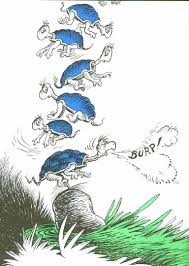weekly column
|
Each week, find a commentary on something connected to verses of Torah or another source of wisdom
|
|
Each week, find a commentary on something connected to verses of Torah or another source of wisdom
|
 The Last of Deuteronomy Also the whole Arava on the east side of the Jordan, as far as the sea of Arava, at the foot of the slopes of Pisgah. Deuteronomy 4:49 You can have your Cat in the Hat and your Grinch. For my money, the best story by Dr. Seuss is “Yertle the Turtle.” Since I first heard it when I was a mere sprout of a lad, I loved it. The name cracks me up. The premise (more in a moment) is delightful. And the denouement, if you can use such a word about a children’s book, involves the first appearance in a published children’s book of the word “burp.” Plus, my uneducated ears heard in the character’s name football great Y.A.Tittle, itself the source of a certain hilarity. What more can you ask for? In case your copy is missing, here is the premise: Yertle is the king of the pond, declaring himself the ruler of all he can see. When he discovers that the higher up he sits, the more he can see, he recruits a turtle named Mack and eight others to serve as his throne, and then more and more turtles to sit one atop the other so that King Yertle can increase his sovereignty as “ruler of all that I see.” Yertle’s downfall (literally) occurs when he attempts to stack his subjects higher than the moon. Poor Mack, at the bottom of the teetering tower of testudines (thank you very much), has the misfortune to burp, toppling the column and sending Yertle into the mud below. Dr. Seuss was quite open about the book being a parable about Adolf Hitler and was pleased to have it understood about authoritarianism in general. And I know, now that I have written the “H” word, that some readers will understand me to be drawing another parallel. Restrain yourselves. Throughout history, lots of people who find themselves in positions of authority have misunderstood the source of their power. It may be that in our democracy, the consent of the governed is necessary to be put in charge, but even in much smaller social ecosystems (marriage, clubs, faith communities, the playground) it requires humility and respect to avoid overreaching. If the goal of an individual is to remain, even increase their power and influence, sooner or later they will attempt to persuade others to devote themselves to the person, not the cause. And they will acquire as much as they can of whatever represents that power and influence. For Yertle, it was “all I can see.” For the greedy, it is money. For sexual predators, it is adoring acolytes. For narcissists, it is (mostly undue) praise – and revenge against critics. But if we are going to be honest, it is usually about real estate. Kings and other potentates, right through to today’s national entities, want land, and mostly more land than they have need for. That’s not to say that such an aggregation of control over territory does not have some beneficial result in certain circumstances. The acquisition of what is now the United States from sea to shining sea involved a variety of conquests or negotiations, none of which acknowledged the rights of the indigenous peoples. But for all the faults belatedly recognized, no one seriously suggests the dissolution of the republic. When Moses beheld the land he was not to enter, it included a prominent mountain east of the Jordan river and an expanse of land surrounding and south beyond (what we now call) the Dead Sea. Many tribes lived in that land. Today it is an uncontested part of Jordan. But there it is in the Bible, vouchsafed to the Israelites. Yertles are everywhere, from local zoning commissioners to presumptive leaders of global empires. Climbing onto the backs of the people who give them authority, they try to expand their power and influence by land-grabs justified by rationales as earnest as they are specious. When that happens, someone should burp.
0 Comments
Leave a Reply. |
Archives
October 2023
Categories |